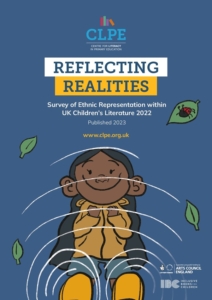Latest CLPE Reflecting Realities survey shows sustained upward trend in the volume of inclusive literature for children
The Centre for Literacy in Primary Education’s (CLPE) 6th annual Reflecting Realities Survey of Ethnic Representation within UK Children’s Literature shows that 30% of children’s books published in 2022 feature a racially minoritised character, a significant and consistent increase from the 4% first reported in 2017. This increase is also echoed in the increase of racially minoritised main characters up from 1% in 2017 to 14% in 2022 and a 5 percentage point increase on last year.
 However, for the first year in its history the report does not show an increase in representation across all text types. Only fiction titles showed an increase in racially minoritised presence, while there was a year-on-year decrease in presence for non-fiction and picturebooks.
However, for the first year in its history the report does not show an increase in representation across all text types. Only fiction titles showed an increase in racially minoritised presence, while there was a year-on-year decrease in presence for non-fiction and picturebooks.
Minoritised representation in fiction increased from 11% in 2021 to 24% in 2022, while representation in non-fiction dropped from 41% in 2021 to 30% in 2022, and picturebooks from 61% to 52% year on year.
The increase in representative fiction was welcomed by CLPE as much needed and going some way towards closing the marked gap between the text types, but warns it will be important to continue to carefully monitor the gap to ensure that the gains made in recent years are not undermined through a regression of presence.
Quality matters
The core aim of the survey is to determine the extent and quality of representation of racially minoritised characters featured within picturebooks, fiction and non-fiction for ages 3-11 published in the UK. The survey is also designed to encourage and support publishers to produce high quality ethnically representative and inclusive literature to enrich the stories available to all children.
The report authors emphasise that having ‘fully actualised and sensitively rendered racially minoritised’ characters at the heart of stories, who steer and shape the narrative, is integral to meaningfully reflecting realities. Authors highlighted in the report for achieving this quality of writing include Catherine Johnson and Patrice Lawrence, with newcomers Varsha Shah and Sabine Adeyinka picked out too.
This year’s report goes into some depth analysing the quality of representational writing, finding much to praise, and concludes that ‘inclusive, good quality, multi-dimensional, engaging characterisations and storytelling are absolutely achievable and we have a fantastic range of new and long-established talented authors and illustrators producing entertaining, moving, memorable, unique, powerful and striking work.’
Farrah Serroukh Executive Director of Research and Development said, ‘We welcome the increase in overall output and were pleased to encounter more variation in the breadth of realities reflected in the literature we reviewed. We encourage publishers and creatives to build on the traction of recent years and continue to strive towards improving the volume and quality of titles that meaningfully reflect realities available to young readers.’
To view CLPE’s Reflecting Realities Survey of Ethnic Representation within UK Children’s Literature click here.
The annual CLPE survey was launched in 2018 and has been funded by Arts Council England since its inception. The publication of this year’s survey was also supported through a donation from Inclusive Books for Children.
The 26 percentage point rise in representation from the first report indicates that there are significantly more representative titles available to young readers now than there were 6 years ago.
Once more the annual report will provide a benchmark and guidance for those working with children in the wider sphere to ensure children have the opportunity to experience books that provide affirmation by reflecting their realities, and broadening their outlook by experiencing realities beyond their own. CLPE will continue this work with the publication of Reflecting Realities in the Classroom (Sage, April 2024), which will investigate how engagement with inclusive literature positively impacts school reading cultures and will provide practical support for teachers to explore quality representation in the classroom.





